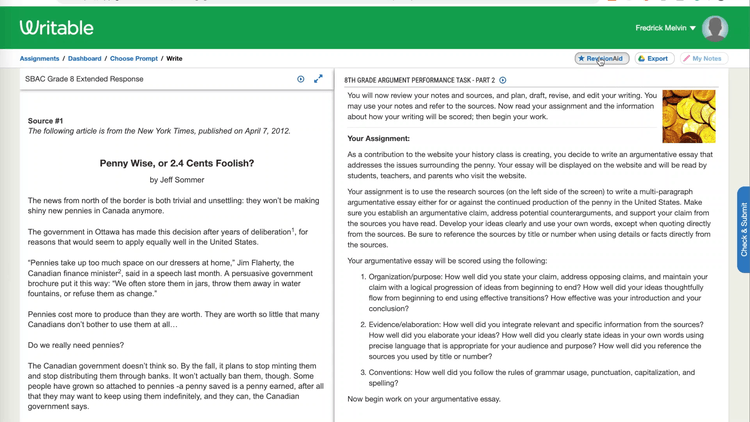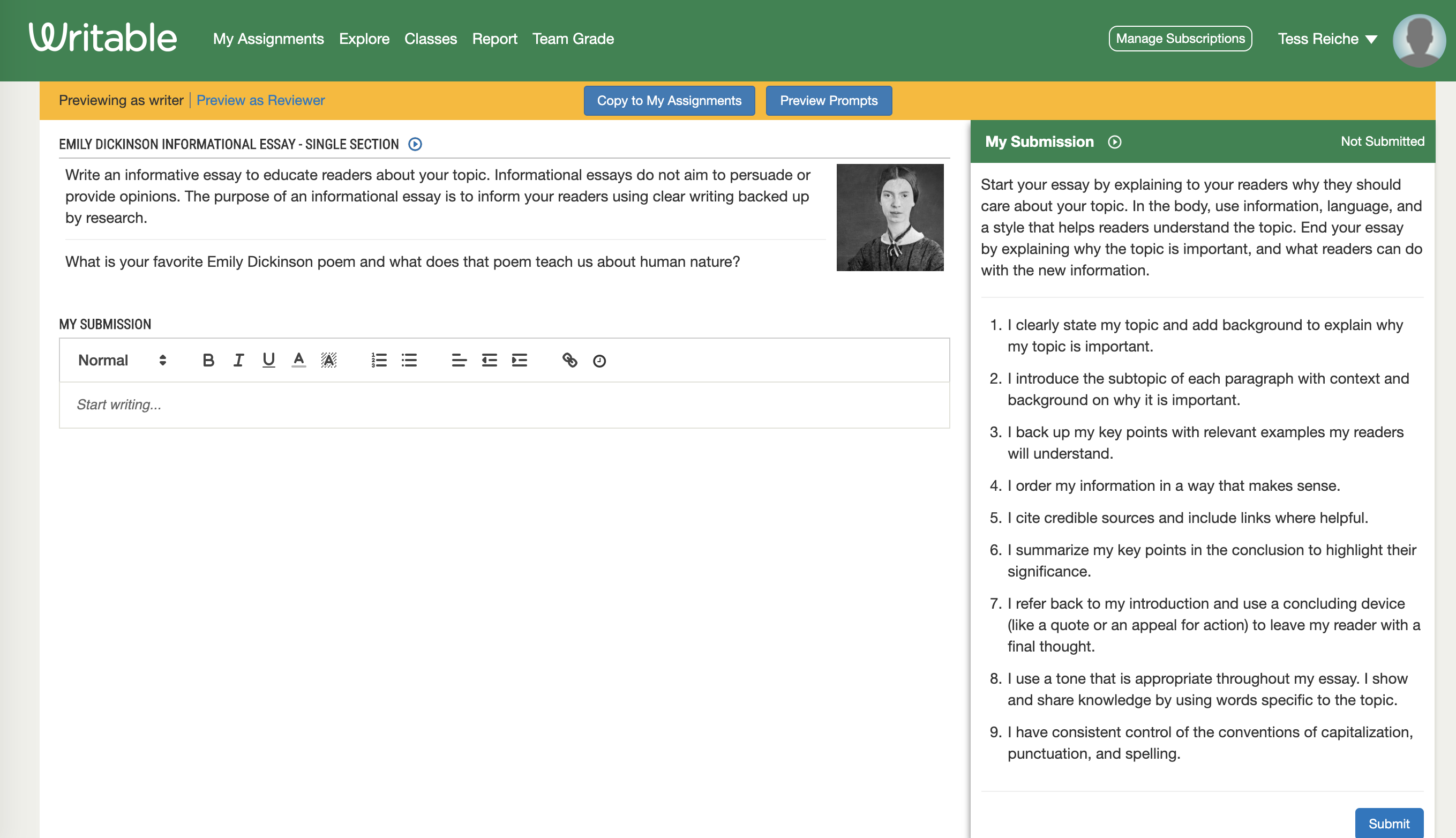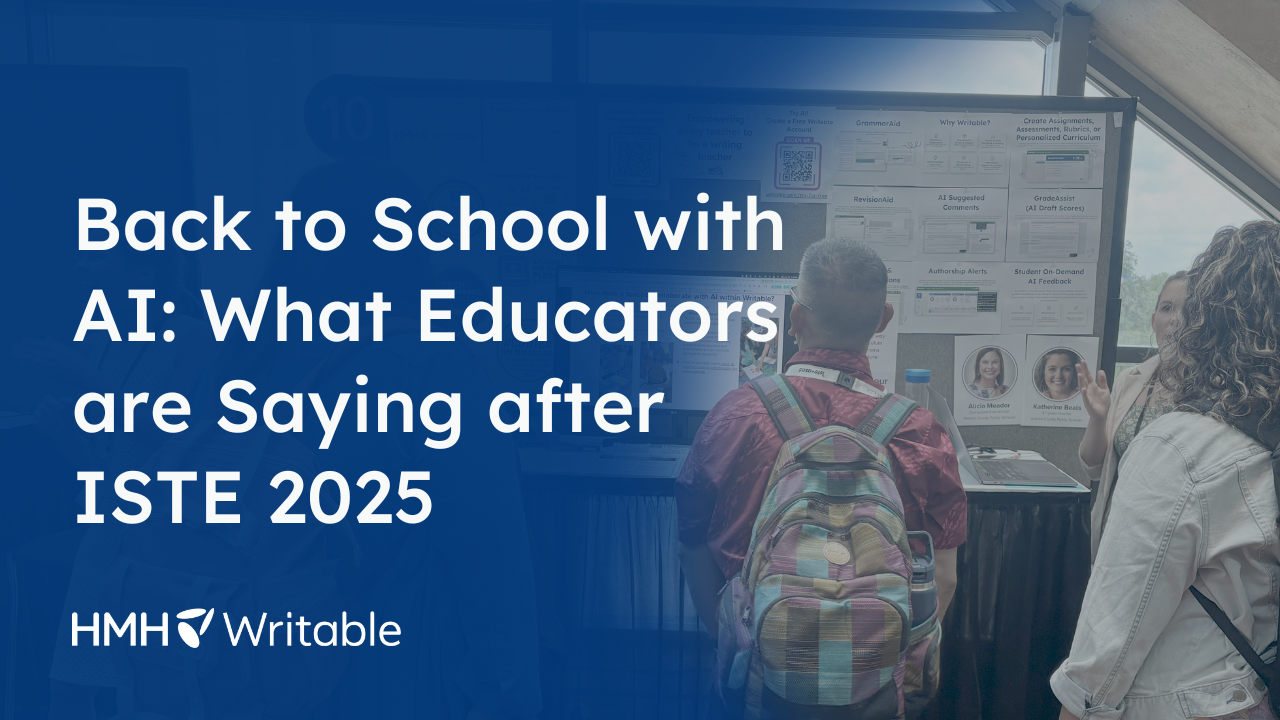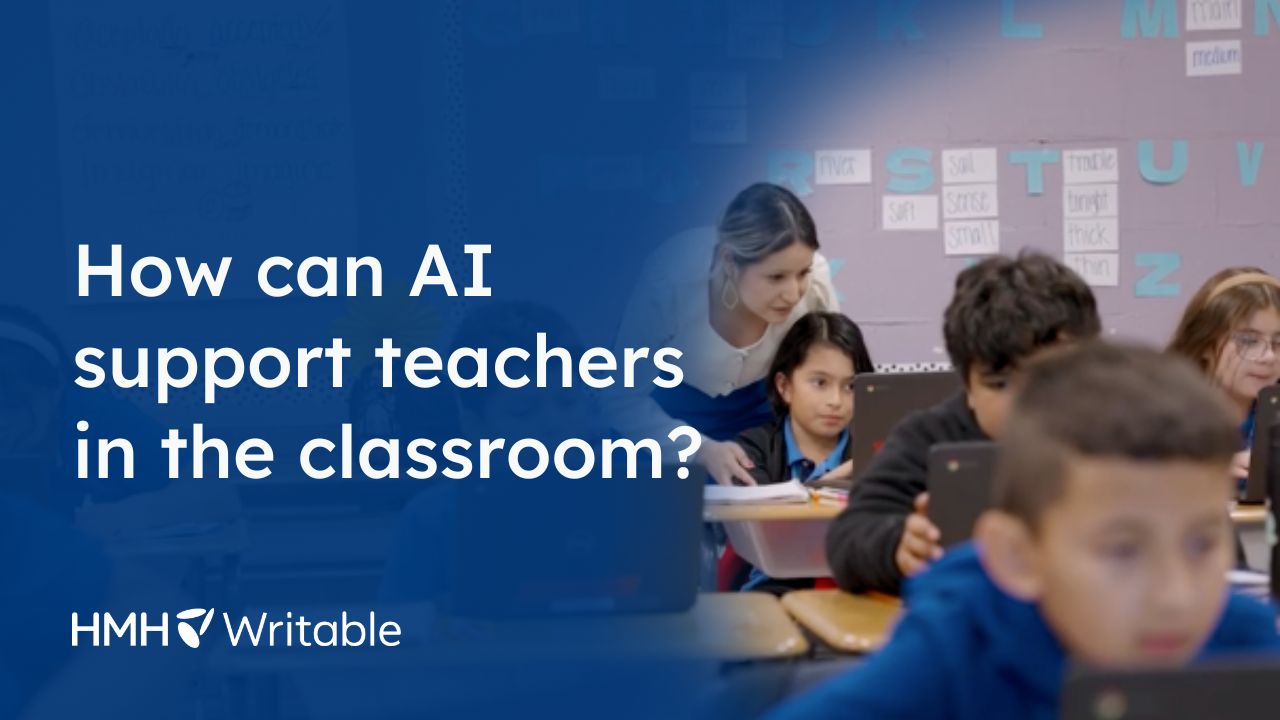By Dr. Jamey Heit, CEO + Co-founder of Ecree
We hear a lot about Artificial Intelligence (AI) in education these days. Research tells us that there are many benefits that AI can bring to the classroom to improve learning and teaching, but we must also be mindful of what these technologies cannot do and their limitations.
This phrase, “AI in education” is broad, so for starters I’d like to define the term as we think about it at Ecree (which powers RevisionAid in Writable). From there, it becomes easier to think about how educators can successfully harness AI technologies in the classroom.
Artificial Intelligence in Education
Broadly speaking, AI can be thought of as technology that mirrors some characteristics of human activity. Too often we imagine AI as a robot with superior intellect or a computer system programmed to beat past Jeopardy winners. For all the hype though, AI can be pretty mundane. Have you ever used spell check in Microsoft Word? That’s AI. Spell check provides the kind of insight a human editor would.
As technology has improved, AI has evolved from things like spelling and grammar to much more robust products. The rise of adaptive learning engines that target student needs based on data is a more complex version of AI that you may be familiar with. Though it seems complicated (and the algorithms that drive these products probably are), the basic definition holds. AI is “thinking” about a bunch of data, and then summarizing it in a way that teachers can make sense of quickly.
In defining AI, it’s important to recognize a key characteristic: AI usually doesn’t go beyond the ability of a teacher when it comes to what matters for student learning. AI in education, like teachers, is simply trying to help students build foundational skills. AI’s real benefit is in doing things a human can do far more quickly than a human. Teachers could theoretically spend many hours sifting through hundreds or thousands of data points and come up with data-driven insights into student learning trends. Teachers can definitely spend their time correcting spelling and grammar. But the power of AI is that technology can do these time-consuming tasks consistently and objectively in a fraction of a second.
How AI Saves Teachers Time
This idea is at the core of what Ecree’s AI writing software does, and what you might already be familiar with if you’ve tried using RevisionAid in Writable. The goal of Ecree’s technology is to provide immediate formative feedback on student writing. This feedback is focused on the key foundational elements of good writing: organization, argumentation, use of evidence, and analysis. These are the common elements of rubrics that are used to score student writing. Ecree’s AI isn’t looking for “new” things, it is simply doing what humans do with a rubric: using those rules of good writing to assess student work.
The benefit of using a technology like Ecree or RevisionAid is simple: save teachers time by automating a mundane portion of the learning process.

The implicit and crucial point here is that Ecree is not designed to replace teachers. Ecree, like all AI, cannot do everything the human brain can do. Teachers will always be needed for more complex and conceptual feedback, like talking to students about why their ideas in a paper relate to their lives outside of the classroom. The purpose of Ecree’s AI writing software is to save teachers time on the things a computer can do so teachers have more time to focus on the things a computer cannot do.
AI is designed to be your assistant that provides you with speed and scale. The best use of AI is combining this horsepower with your human expertise.
Faster Feedback Loops
Let’s take a closer look at what this means. Speed is something that drives improvement in student outcomes. Students learn in predictable ways. The more positive feedback loops you can provide on student writing, the more likely the student is to build the basic skills those feedback loops are designed to address. If those feedback loops can be sped up, the impact of the feedback will happen sooner.
Imagine a skill you’ve learned in the past. If you tried to teach yourself, you were likely frustrated at times. I often tell the story of my own efforts to learn a musical instrument. Between books and tutorial videos and my own time practicing, I could start to make sense of how I “should” be playing the instrument. The problem was that I didn’t have quick feedback to guide me. If I thought I was making a mistake, I had to leave the instrument and go look up what I thought the answer might be. Then I had to go back and try to apply that answer.
If I had a music teacher, the entire process would be more effective. That teacher would correct me more efficiently and effectively.
The faster we can provide feedback to students, the better. By using Ecree or RevisionAid, students get immediate feedback on their writing, so they can address mistakes as they happen. This has the power to be as impactful and thoughtful as informed comments generated by a teacher.
Educator Evolution
With Ecree’s AI, which you can use in Writable with RevisionAid, students get formative help that will ultimately produce a better piece of writing for the teacher to give their feedback on. Because the teacher doesn’t have to spend time sifting through topics sentences and whether the student has connected evidence to the point being argued, the teacher can work with the student on those things that AI cannot assess.
One of my favorite assignments I ever gave to my literature students was: What is your favorite Emily Dickinson poem and what does that poem teach us about human nature?
The answers to these questions provide a broad basis for working with students on how they understand their own experiences and how they’ll navigate a rapidly changing world. Expanding the discussion of these things in person is, for me, the joy of teaching writ large. When I think back to when I assigned this paper, I realize that I didn’t get to talk about those things very much. And my students were worse off for that. I would gladly have spent more time working with my students beyond the organization of their paper to talk about why that paper matters in some broader context.
The end goal of Ecree’s AI writing software is to optimize the limited time teachers get to spend with students. The best use of AI is to enhance the student-teacher relationship. The more of these localized interactions AI can benefit, the stronger the foundation of education will be.
![]()
Dr. Jamey Heit is a lifelong learner and lover of technology. He believes technology plays an essential role in solving big problems and insists that it is part of a broader solution, rather than a quick fix to a temporary challenge.
He holds a Ph.D. in Literature, Theology and the Arts from Glasgow University and has taught in a variety of Higher Education disciplines. During his time in the classroom, Dr. Heit saw limits in his ability to help students consistently improve their writing. So, in 2014 he left academia and founded Ecree, a technology company that specializes in a proprietary, interactive writing tool for students and teachers.
Dr. Heit is on a mission to nurture a generation of better writers and thinkers with widespread access to easy and adaptive writing software. With the Ecree technology, he’s able to provide consistent, timely, and quality feedback to students to ensure they develop lifelong skills for success.
![]()
Are you new to Writable curious to learn more? Create a free teacher account, check out our pricing, or schedule a personalized demo!





